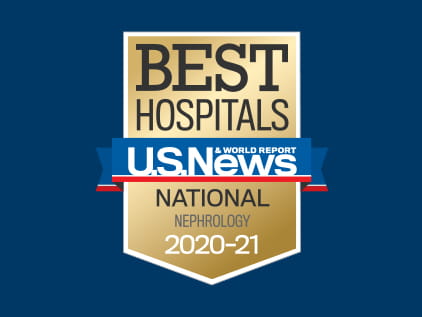- Home
- Conditions and Care
- Conditions
- Kidney Disease
- Kidney Disease FAQ
Kidney Disease
Kidney Disease FAQ
If you’ve been diagnosed with chronic kidney disease or kidney failure, it’s normal to have questions about how the condition progresses and what to expect. Our team of skilled specialists can walk you through the entire continuum of care from diagnosis to dialysis and kidney transplant if necessary.
We offer a variety of appointment types. Learn more or call 913-588-1227 to schedule now.

Unmatched care, year after year
We are proud to still be the best hospital in Kansas and in Kansas City according to U.S. News & World Report – the only hospital to receive this award since its inception. Now and always, we are here for you.




